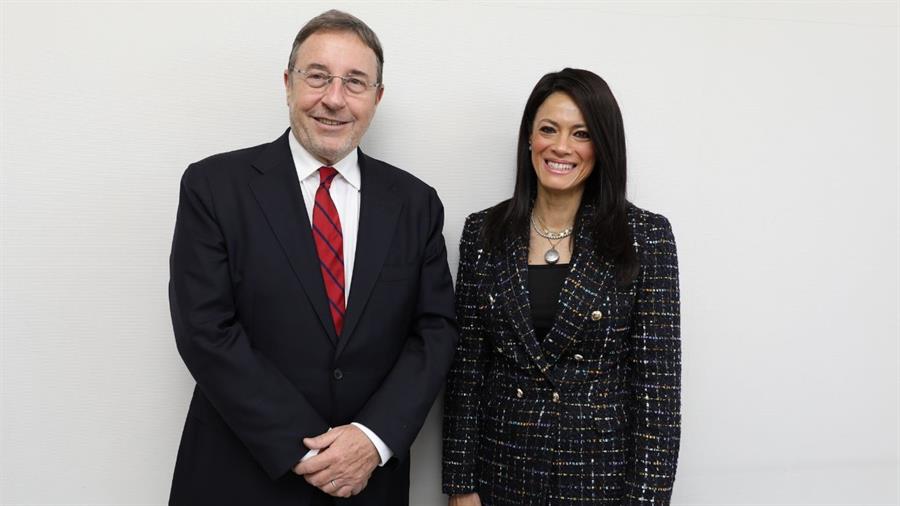At the conclusion of her visit to Tokyo, the Minister of Planning, Economic Development, and International Cooperation Meets UNDP Director

19 December 2024
"Al-Mashat" discusses various aspects of the partnership with UNDP and preparations for the Fourth International Conference on Financing for Development in Spain.
"Al-Mashat": We are keen to strengthen cooperation with the programme in the areas of entrepreneurship and private sector empowerment.
Constructive cooperation with the programme to implement Egypt's integrated national strategy for financing development.
We look forward to the issuance of the new Human Development Report and reports on localizing the SDGs.
H.E. Dr. Rania A. Al-Mashat, Minister of Planning, Economic
Development, and International Cooperation, held a bilateral meeting with Mr.
Achim Steiner, Administrator of the United Nations Development Programme
(UNDP), to discuss enhancing cooperation during her visit to Tokyo, Japan, to
participate in the celebrations marking 70 years of Egypt-Japan development
cooperation.
During the meeting, H.E. Dr. Al-Mashat emphasized the
deep-rooted relationship between Egypt and the UNDP, noting the progress of cooperation
over decades across multiple sectors and activities aimed at achieving
sustainable development and enhancing economic and social reforms. H.E.
highlighted the Egyptian government’s commitment to supporting and
strengthening its partnership with the programme in areas such as
entrepreneurship and private sector empowerment.
H.E. Minister Al-Mashat also indicated that the cooperation
between the Egyptian government and UNDP has become more integrated and
coordinated, built on the foundation of the country programme documents, the
latest of which is the new Country Programme Document (CPD) for Egypt for the
period 2023-2027. This programme focuses on the strategic priorities
established under the United Nations Sustainable Development Cooperation Framework
(UNSDCF), including human capital, sustainable growth, good governance, climate
action, and women’s empowerment across various sectors.
Regarding the cooperation portfolio between Egypt and UNDP,
H.E. Dr. Al-Mashat noted that the programme currently encompasses about 45
active projects in various fields in Egypt. H.E. pointed out that UNDP is one
of Egypt’s key partners in advancing sustainable development. H.E. mentioned
some of the flagship projects being implemented in Egypt, including the development
of small and micro enterprises, promoting digital transformation and innovation
through the support of the Applied Innovation Centre, and enhancing climate
change adaptation in Upper and Lower Egypt.
H.E. Minister Al-Mashat also highlighted projects under the
Ministry of Planning, Economic Development, and International Cooperation
within the UNDP portfolio, such as the Egyptian Network for Integrated
Development (ENID) project, funded by the BHF Foundation and the Spanish Agency
for International Cooperation, which aims to enhance crisis resilience in rural
areas of Egypt, as well as several other collaborative projects with the
programme.
H.E. Dr. Al-Mashat also discussed the upcoming Financing for
Development Forum in Seville, emphasizing Egypt's interest in participating as
it provides a key platform to explore innovative financing mechanisms that
could accelerate sustainable growth and achieve inclusive development goals.
H.E. stated that the forum will serve as an opportunity for the Ministry to showcase
Egypt's significant achievements in economic reforms, green transition, and
inclusive growth, as well as highlight digital transformation programs, the
2025 Human Development Report, and debt swap initiatives, all of which reflect
Egypt’s ability to continue progressing toward sustainable development.
The two sides also reviewed the ongoing cooperation
regarding Egypt’s Integrated National Financing Strategy and the 2025 Human
Development Report. H.E. Dr. Al-Mashat expressed Egypt’s eagerness to collaborate
with UNDP on the forthcoming Human Development Report 2025. H.E. highlighted
the Ministry's efforts, in partnership with UNDP, to ensure that the new report
provides comprehensive and in-depth analyses based on national challenges,
helping to guide policies toward achieving sustainable and inclusive
development.
The meeting also touched on cooperation on the
Debt-for-Nature Swap initiative, the Debt Swap Agreement for the Conservation
of the Red Sea, and ongoing collaboration on the upcoming 27th report on
localizing the Sustainable Development Goals (SDGs). These reports are seen as
practical steps to enhance local roles in achieving the SDGs, as well as
collaboration on developing investor maps for the SDGs, which aim to promote
investments that have a positive impact in key investment areas in Egypt.









